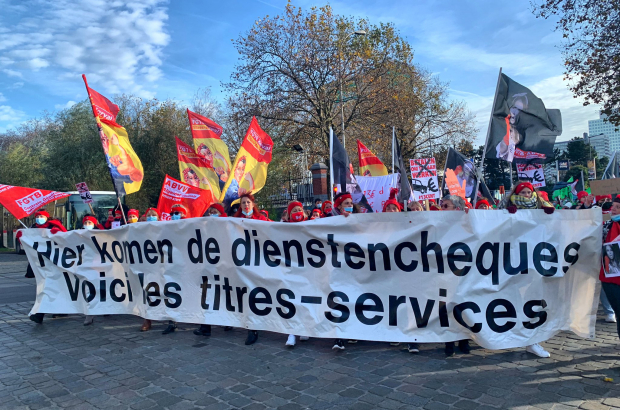- Daily & Weekly newsletters
- Buy & download The Bulletin
- Comment on our articles
Household workers protest at ‘scandalously low’ reimbursement of transport costs
Workers in the household help industry who are paid with service cheques took to the streets of Brussels today to protest at the personal costs involved in their transport from place to place. Some 600 cleaning people marched from Brussels North Station this morning to employment association Federgon at Tour & Taxis.
Cleaning jobs requires workers to drive to different homes throughout the day. They pay for petrol themselves and then are reimbursed by their companies. But they are only getting 13 cents per kilometre, which is not nearly enough, according to unions.
Often they must also pay for parking in front of homes, and not every company reimburses this cost. Altogether, cleaners are spending their own money to be able to carry out their jobs, say union representatives.
“Transport represents a significant cost for these workers, who already receive very low wages,” said the unions in a joint statement. “The travel allowances these domestic workers receive for this are scandalously low and in no way cover the real costs. The sector pays 13 cents per kilometre, while the government standard is 37 cents per kilometre.”
The unions also point out that the price of petrol is currently skyrocketing and that parking costs are “in most cases” not reimbursed. “And travel to the office to handle administrative formalities such as turning in service cheques usually takes place during their free time. This all has to stop!”
Negotiations about pay rises and the reimbursement of expenses have broken down, so the workers decided to strike today and march to the Federgon, which represents companies that use service cheques.
Cost of cheques to increase
Speaking of service cheques – get ready to pay more for them if you live in Brussels. The system whereby families can buy the cheques to pay household workers at a much better price than paying workers directly is about to get more expensive.
The three regional governments subsidise the system so that households can afford help with cooking, cleaning and other household chores when they need it. But the Brussels regional government has a gap to fill in its budget, and €5.3 million has to come from labour minister Bernard Clerfayt (Défi).
Cheques currently cost €9 each, a price “that hasn’t changed since 2014,” said Clerfayt in parliament this week. “If you take inflation into account, you could say they have become much more advantageous every year.”
Clerfayt isn’t putting an exact figure on the price increase yet did say that “if we index them according to the cost of living, we come out at about €1 more per check”. In 2021, the region has spent €243 million on service check subsidies.
Photo courtesy Françoise De Smedt/Twitter

















